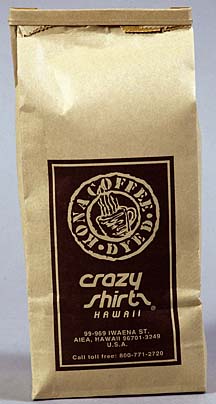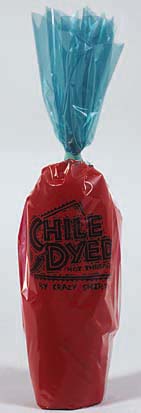

|
TheBuzz Erika Engle |
Crazy Shirts
turns 40Crazy Shirts, a heritage Hawaii company started by a kid on summer break from college, is 40 this year.
It has seen way-high ups, including better than $90 million in gross sales in 1996, to way-deep lows, including events leading to its $8.25 million sale at a 2001 bankruptcy auction.
Crazy Shirts' coffee dyed products come in a bean bag.
"When we started out, we were the only game in town, the world's first nothing-but-T-shirt store," said founder Rick Ralston.
It stayed that way from 1964 to 1970, "when we were on the cover of Parade Magazine."
"What that did for us was bring us competition," he said.
Competitors' quality ranged from "cheap to decent, but ours was the only custom-made shirt. Crazy Shirts were custom-made to a higher standard, from the thread-count up to the combed-cotton to the detailed construction," he said.
"That's still what holds Crazy Shirts above anybody else."
Waikiki Traders Corp. was the winning bidder at the bankruptcy auction, buying the company "for a myriad of different reasons," said Crazy Shirts President and Chief Executive Officer Mark Hollander.
He rattled off a few. "Iconic status, the quality product, quality image, the brand, all of these facets added up to such a winning combination."
Long-term employee commitment was also a factor. Purchasing agent Remy Alipio is among a few with more than 30 years with the company, while more than a dozen others have been employees 20 or more years.
"One of the first things we did, in February 2002, we moved the production facility, which was located in Tustin, Calif., back to its kind of ancestral home in Halawa Valley," Hollander said.
There are 415 employees company-wide.
There are 38 Crazy Shirts stores, 14 on the mainland, 24 in Hawaii. Two million Crazy Shirts catalogs are distributed annually and www.crazyshirts. com rakes in sales and potential designs from freelance artists.
Artist Lee Samson is a former Crazy Shirts designer who met Ralston in the 1970s while in college. After a year or so on the mainland he moved back, called Ralston, asked for and got a job.
"Rick was a personable, nice guy, and he let you share in the booty."
Chile is one of the dye "flavors" used by Crazy Shirts.
Designers were paid royalties as well as salaries. One of Samson's designs made him $25,000, he said.
Ralston knew the art was what people were buying.
"We had a great shirt, but the art was what it was and I wanted to reward these people," he said.
Having Crazy Shirts on Samson's resume opened doors.
"It helped my career a lot. I'm thankful to (Rick) for that," said Samson.
Employees also received a fourth of the company's annual profits.
Hollander doesn't discuss numbers but said, "sales have continued to grow with tourism and we're very happy."
Despite massive competition in the T-shirt business, Hollander believes Crazy Shirts still enjoys local popularity. "There's a lot of long time fans."
Those fans can spend anywhere from $1 to around $50 on stuff from stickers to caps to board shorts, as well as T-shirts.
Twice a year, special Love-A-Cat and Love-A-Dog shirts are designed to help the Hawaiian Humane Society raise funds and awareness. It's been that way for more than 20 years, said Community Relations Director Jacque Smith.
The society receives a portion of the proceeds "and at the time of purchase when somebody buys a shirt they get a coupon for a free microchip for their cat (or dog)," she said.
Some 20 years earlier, Ralston didn't understand the legal ramifications of incorporating, "but "I was having a hard time getting credit from vendors." He thought, "maybe if I change the name from Rick's Crazy Shirts to Crazy Shirts Incorporated it'll sound better and maybe I can get some credit from vendors."
It helped.
The company grew to 65 stores and 1,000 employees, which Ralston describes now as "out of hand."
Crazy Shirts now plans "measured growth," in Hawaii and on the mainland, Hollander said.
Just as Hollander doesn't discuss the company's earlier problems, Ralston has only praise for those who bought his company out of bankruptcy.
"The new management team came in and respected the company, its culture, the people, the quality of the product and is dedicated to maintaining that, which makes me feel really good," Ralston said.
See the Columnists section for some past articles.
Erika Engle is a reporter with the Star-Bulletin. Call 529-4302, fax 529-4750 or write to Erika Engle, Honolulu Star-Bulletin, 500 Ala Moana Blvd., No. 7-210, Honolulu, HI 96813. She can also be reached at: eengle@starbulletin.com

